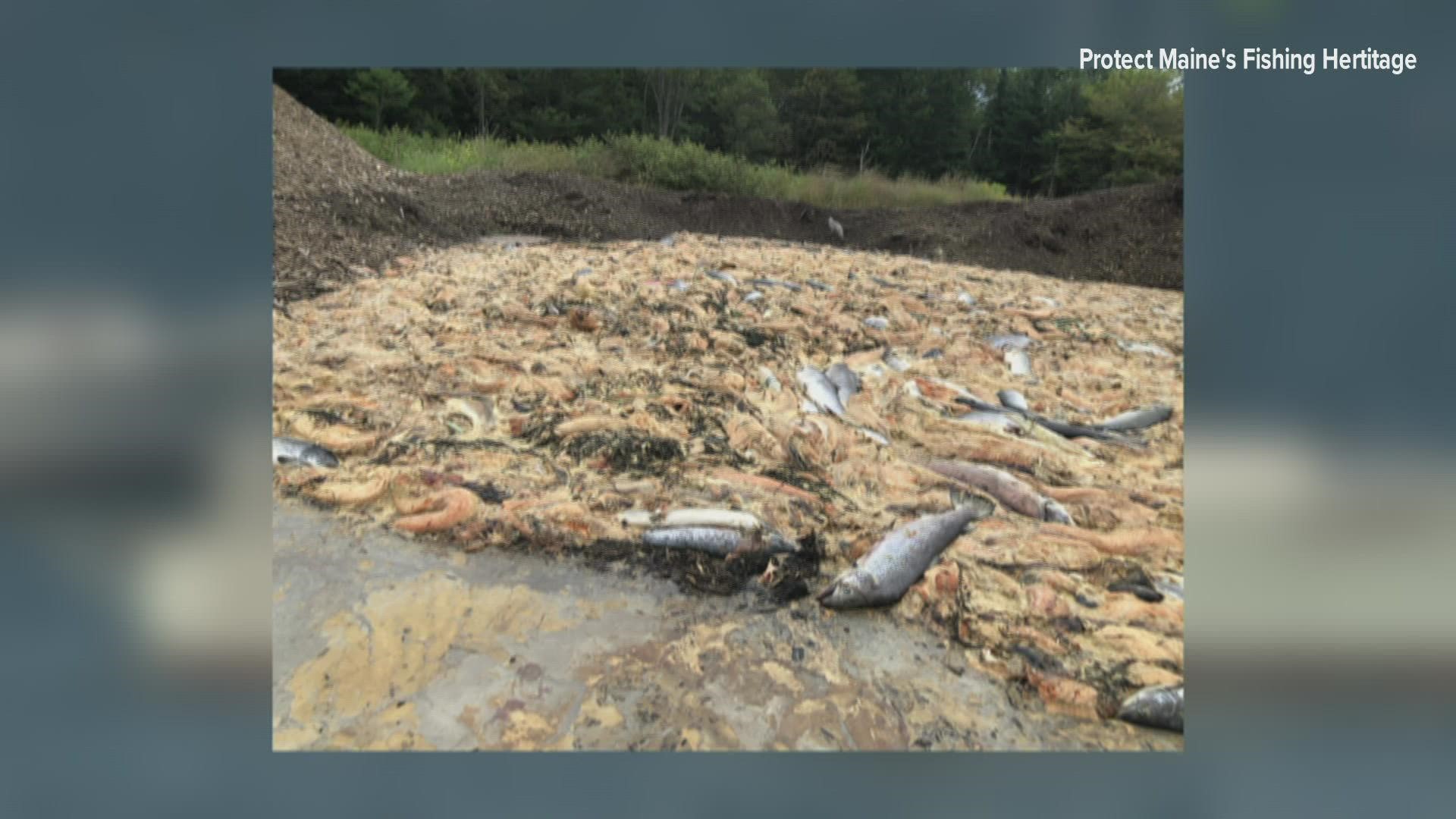BAR HARBOR, Maine — EDITOR'S NOTE: The video above is NEWS CENTER Maine's reporting from Sept. 24, prior to when the DEP released its findings.
The Maine Department of Environmental Protection said in a release Monday that it found no permit violations or violations of the Clean Water Act in relation to a massive salmon die-off at a Cooke Aquaculture farm off Black Island.
Black Island is off the coast of Mount Desert Island. The company found that more than 100,000 fish died between its Black Island and Black Island South net pens in the month of August.
Cook Aquaculture was not required to report the deaths to the DEP but still did so on Aug. 27, 11 days after they discovered the massive die-off, the DEP said.
According to Monday's release, DEP staff did not find evidence of excessive net pen fouling when they inspected the sites on Aug. 31.
"Visibility in the water was limited to about 5 to 8 feet and the net pens had been cleaned within the last week," the DEP said in a release.
RELATED: Salmon 'die-off' incident raises concerns about the state's future in large-scale aquaculture
Here is what the DEP said it found in terms of oxygen levels in the net pens:
"Cooke Aquaculture provided to DEP daily dissolved oxygen (DO) readings collected in the 30-meter mixing zone outside the net pens at Black Island and Black Island South net pen sites for the period of July 1, 2021 – August 31, 2021. The permit limit for DO within the mixing zone is 6.0 mg/L. Cooke’s lowest measure of DO in the mixing zone for the period submitted was on August 10, with a reading of 6.5 mg/L at both sites. On August 13, 2021 they reported DO readings of 6.9 mg/L and the DO increased over the weekend to 9.0 and 8.4 mg/L. On August 16, when the mortalities were reportedly discovered, Cooke measured mixing zone DO at both sites of 8.1mg/L. Cooke is not required by the DEP permit to track or report DO within the net pen sites. However, they were able to provide data for August 1st to 25th for a single pen at Black Island South. The lowest reported DO levels in the single pen on August 15 and 16 were 4.9 mg/L.
Additionally, all pen densities reported to the Department during June, July, and August were within permit limits."
The DEP said Monday it has closed its investigation into the matter after finding no infractions.
After hearing of the die-off at Cooke Aquaculture, advocacy groups like Protect Maine's Fishing Heritage expressed concerns about how the salmon die-off might affect the environment underneath the net pens.
On Monday, Protect Maine’s Fishing Heritage executive director Crystal Canney responded to the DEP's findings.
“So the obvious question is – what killed the fish? You won’t find answers in the statement issued today, and we are still waiting to hear from the Department of Marine Resources (DMR), the primary regulating agency on net pen salmon," Canney said. "DMR was very quick to say that it was a dissolved oxygen issue, but the DEP has already ruled that out in its statement today.”
Canney said her organization has filed a Freedom of Access Act for notes and correspondence that went into the DEP arriving at its conclusions.
Prior to the DEP inspection, a spokesperson for Cooke Aquaculture told NEWS CENTER Maine, "A fish health incident is not a violation of a Department of Environmental Protection permit, but rather an unfortunate event which can happen naturally in aquaculture farming from time to time."
The Canadian-based company notified the Department of Marine Resources before other agencies, according to Cooke Aquaculture. The spokesperson added the mortalities from the die-off "were a result of uncommonly low oxygen levels in the cages."
The DMR concluded the event was an issue of low oxygen in the pens, which is not a compliance issue.
EDITOR'S NOTE: The video below is NEWS CENTER Maine's reporting from Sept. 24, prior to when the DEP released its findings.

